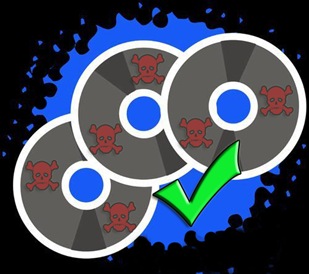 From Torrentfreak.com 24.03.08:
From Torrentfreak.com 24.03.08:
If you are downloading stuff you wouldn’t have bought in the first place, according to economist Karen Croxson, you are probably doing the company that created the product a big favor. You, Mr ‘Good’ Pirate, are telling your friends, adding to the media ‘buzz’ and driving up sales.
Many pirates say that they would never have bought much of the stuff they downloaded or copied. If you fall into this category, you might be a ‘good’ or ‘promotional’ pirate. Croxson says that piracy is only a threat to sales when people who originally intended to buy, didn’t, and pirated instead. The others - of which there a many, many millions - never intended to buy and these, says Croxson, cannot possibly harm the seller.
Croxson’s view on this type of piracy is one that I’ve long agreed with. While these good pirates are technically breaking the law, they cannot be said to participating in an act of ‘economic piracy’ – for want of a better term. In other words, while these people may be infringing someone’s intellectual property rights, they are not defrauding them from revenue. There can be little doubt that getting to the root of the problem is the most effective means of combating piracy. However, companies have often made an awful fist of going about it. The worldwide DRM debacle is a case in point.
As is frequently mentioned on so many of the TWiT podcasts I listen to, DRM only hurts the ‘good guys’ and does little if anything to deal with the root problem: the hardcore, mass market pirates. In the case of DRM, it only inconveniences or, at worst, screws over the people who have genuinely purchased the material and want to enjoy it on several devices. Content vendors though, are catching on; DRM is becoming more flexible in that regard and in some instances, disappearing all together. Just look at the Amazon music store in the US who realised that far from protecting profit margins, DRM is actually hurting them. It was time to get rid.
Croxson’s speech, essentially, just re-iterated several well-known facts: people often download content illegally they were never going to buy legitimately. Far from being universally bad for businesses, you can definitely make the argument that some forms of piracy actually help. A person may illegally download a couple of ‘taster tracks’ of an artist’s work and then go out and buy the whole album. In that sense, you could argue, that kind of piracy DRIVES sales. In the same way, good publicity spread via ‘word of mouth’ from someone who has downloaded material illegally may encourage others they mention it to, to go out and buy it.
Downloading material for free on the net or making an illegal copy of a friend’s movie, CD or program, etc. clearly can have a negative impact on businesses who sell creative content. Worse still, is the problem presented by the mass market pirates who, frankly, screw everyone over. But still, Croxson’s points are well worth pointing out. In the scurry to protect their intellectual property rights at all costs, many content owners lose sight of the broader issues involved and end up inadvertently hamstringing themselves.
Don’t get me wrong, I’m not in favour of piracy per se but this story reminds us that piracy issues are by no means black and white, good and bad – there’s a significant amount of grey in between. Maybe it’s time that creative content producers started recognising that and making good use of it.
Well... If there was no piracy, then the person who would not have bought it anyway, would only realise it after buying it >> profits for the maker. :)
ReplyDeleteErrr, yeah. Interesting logic, Andro! Hadn't thought of it quite like that. :-)
ReplyDelete